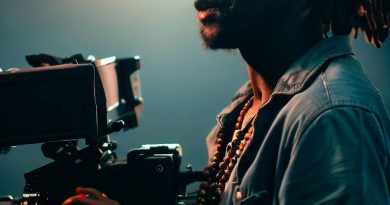Legal Aspects of Music Publishing in Nigeria
Last Updated on August 31, 2023
Introduction
Music publishing involves the management and exploitation of musical compositions by their creators.
Understanding the legal aspects of music publishing in Nigeria is crucial for both artists and composers.
By knowing the legalities, artists can protect their intellectual property rights and earn fair revenue from their music.
Understanding the legal aspects also helps composers negotiate contracts and licensing agreements effectively.
Without a grasp of music publishing laws in Nigeria, artists are susceptible to exploitation and financial loss.
Understanding the legal framework enables pursuing copyright infringement cases when needed.
Music publishing in Nigeria operates within the framework of the Copyright Act of 1988.
This legislation provides protection for the rights of composers, performers, publishers, and other stakeholders.
To formally engage in music publishing, individuals or entities must register with the Nigerian Copyright Commission.
Registration grants legal protection and allows rights holders to take legal action against infringement.
Additionally, understanding the legal aspects enables music publishers to diversify income streams effectively.
By exploring opportunities such as synchronization licensing and performance royalties, publishers can maximize revenue.
Comprehending the legal aspects of music publishing is essential in Nigeria for both artists and composers.
Protecting intellectual property rights, negotiating contracts, and exploring revenue opportunities are crucial for success.
Brief History of Music Publishing in Nigeria
Music publishing in Nigeria has a rich history that spans several decades, marked by notable milestones and significant events that have shaped the industry into what it is today.
This section will provide an overview of the evolution of music publishing in Nigeria, highlighting key milestones and significant events along the way.
A. The evolution of music publishing in Nigeria
- 1950s: The birth of modern Nigerian music industry with the emergence of indigenous record labels.
- 1960s: The golden era of Nigerian music publishing, characterized by the rise of highlife music.
- 1970s: The advent of Afrobeat and the global recognition of Nigerian music.
- 1980s: The decline of vinyl records and the rise of cassette tapes as the dominant music format.
- 1990s: The impact of piracy on the Nigerian music industry, leading to legal battles and the need for stronger copyright protection.
- 2000s: The digital revolution and the shift towards online music distribution platforms.
- 2010s: The rise of Nigerian music exports and the global success of Nigerian artists such as Wizkid and Davido.
Throughout these decades, various key milestones and significant events have shaped the Nigerian music publishing industry.
B. Key milestones and significant events
- 1963: The establishment of the Nigerian Association of Recording Industry (NARI), the first collective body for musicians in Nigeria.
- 1972: The formation of the Performing Musicians Association of Nigeria (PMAN), which aimed to protect the rights and welfare of Nigerian musicians.
- 1984: The introduction of the Nigerian Copyright Act, providing legal protection for creators and their intellectual property.
- 1999: The release of Fela Kuti’s album “Shuffering and Shmiling,” which addressed social and political issues, garnering international attention.
- 2009: The establishment of the Copyright Society of Nigeria (COSON) to collect royalties on behalf of Nigerian musicians and music publishers.
- 2016: The signing of a landmark music licensing deal between COSON and broadcasting organizations, ensuring fair compensation for music creators.
These milestones and events have played a crucial role in the development and growth of music publishing in Nigeria.
They reflect the continuous efforts to protect the rights of musicians, combat piracy, and create a sustainable environment for music creators.
Significant milestones and events shaped Nigeria’s music publishing evolution with a dynamic trajectory.
From the emergence of indigenous record labels to the rise of Nigerian music exports, the industry has experienced both challenges and successes.
Through collective bodies like PMAN and COSON, Nigerian musicians and music publishers continue to navigate the legal aspects of music publishing, striving for fair compensation and stronger copyright protection.
Read: Challenges Facing Music Publishers in Nigeria Today
Copyright Laws and Regulations in Nigeria
In Nigeria, the copyright protection system is governed by the Nigerian Copyright Act.
The Nigerian Copyright Commission (NCC) is the primary government agency responsible for enforcing copyright laws.
The NCC plays a crucial role in the protection and promotion of the rights of copyright holders in Nigeria.
Copyright holders in music publishing have several rights and benefits under Nigerian law.
A. The copyright protection system in Nigeria
- Copyright protection in Nigeria is granted automatically upon the creation of an original work.
- This means that once a musical work is created, it is automatically protected by copyright.
- Registration with the NCC is not a requirement for copyright protection, but it is highly recommended.
- Registration provides evidence of ownership and can be useful in legal disputes.
- Owners of copyrighted works have the exclusive right to reproduce, distribute, perform, and display their works.
B. Role of the Nigerian Copyright Commission (NCC)
- The NCC is responsible for the administration, regulation, and enforcement of copyright laws in Nigeria.
- It grants licenses to individuals and organizations for the use of copyrighted works.
- The NCC also conducts investigations and prosecutes copyright infringement cases.
- It collaborates with other government agencies and stakeholders to develop policies and strategies for copyright protection.
- The NCC educates the public on copyright laws and encourages respect for intellectual property rights.
C. Rights and benefits of copyright holders in music publishing
- Music publishers in Nigeria have the exclusive right to reproduce and distribute musical works.
- They can grant licenses for the use of their works and collect royalties on behalf of the copyright owners.
- Copyright holders have the right to control the public performance and display of their works.
- They can also create derivative works based on their original musical compositions.
- Copyright holders deserve payment for work use, securing a thriving music industry.
D. List of benefits for copyright holders in music publishing
- Financial reward : Copyright holders receive income from the sale and licensing of their musical works.
- Protection against piracy : Copyright laws protect music publishers from unauthorized copying and distribution.
- Control over use : Copyright holders have the authority to decide how their works are used and who can use them.
- Recognition and reputation : Copyright protection helps establish a name and reputation in the music industry.
- Creative control : Copyright holders can control the creation of derivative works based on their original compositions.
- Long-term protection: Copyright protection lasts for the life of the author plus an additional 70 years after their death.
- Collective management : Copyright societies in Nigeria collect and distribute royalties on behalf of copyright holders.
- International recognition : Nigerian copyright laws align with international treaties and conventions.
The copyright protection system in Nigeria provides strong legal safeguards for music publishers.
The Nigerian Copyright Commission plays a critical role in enforcing copyright laws and protecting the rights of creators.
Copyright holders in music publishing enjoy a range of rights and benefits, including financial rewards and control over their works.
By respecting and enforcing copyright laws, Nigeria can promote a thriving music industry and encourage creativity and innovation.
Read: Tools of the Trade: Essential Equipment for Nigerian Costume Designers
Music Publishing Agreements in Nigeria
Music publishing deals are vital in Nigeria’s music sector, fairly compensating artists, composers, and publishers for creativity.
These agreements come in various types, each serving a specific purpose and creating legal obligations.
It is essential to understand the different types and the importance of having written agreements in place.
A. Types of Music Publishing Agreements
- Synchronization Agreements: These agreements grant the right to synchronize music with visual content, such as films, TV shows, or ads.
- Mechanical Licenses: These agreements allow the reproduction and distribution of musical compositions through physical or digital means.
It is crucial for music creators and publishers to have written agreements for several reasons:
B. Importance of Having Written Agreements
- Clear Understanding: A written agreement ensures that all parties involved understand and acknowledge the terms and conditions of their collaboration.
- Protecting Rights: Agreements protect the rights of both the music creator and the publisher, ensuring fair compensation and preventing unauthorized use.
- Legal Protection: Written agreements serve as evidence in case of disputes, helping to resolve conflicts and avoid time-consuming legal proceedings.
When drafting a music publishing agreement in Nigeria, certain key clauses and elements should be considered:
C. Key Clauses and Elements to Consider
- Grant of Rights: Clearly define the rights being granted to the publisher, such as reproduction, distribution, synchronization, and performance.
- Royalty Structure: Establish a fair and transparent royalty structure, specifying the percentage or amount the music creator will receive for their work.
- Term and Territory: Determine the duration of the agreement and specify the territories in which the publisher has the right to exploit the music.
- Accounting and Auditing: Include provisions for accurate accounting and regular auditing, allowing the music creator to monitor the royalties they are entitled to.
- Termination Rights: Outline the circumstances or conditions under which either party can terminate the agreement.
- Indemnification: Clarify the responsibilities of each party regarding any legal claims or liabilities arising from the use of the music.
Music publishing agreements in Nigeria are instrumental in ensuring that all parties involved in the creation and distribution of music are protected and fairly compensated.
Different types of agreements, such as synchronization and mechanical licenses, serve specific purposes in the industry.
Having written agreements is crucial, as they provide clarity, protect rights, and offer legal protection.
Key clauses, including grant of rights, royalty structure, and termination rights, need to be carefully considered to ensure a mutually beneficial and legally binding agreement.
Read: Animation Directing: Nigeria vs. The Global Scene

Royalties and Licensing in Music Publishing
A. The different types of royalties in Nigeria
- Performance royalties: Performance royalties are earned when a song is performed live or broadcasted publicly.
- Mechanical royalties: Mechanical royalties are earned from the reproduction and distribution of a song.
- Synchronization royalties: Synchronization royalties are earned when a song is used in films, TV shows, or advertisements.
- Print music royalties: Print music royalties are earned from the sale of sheet music or songbooks.
- Foreign royalties: Foreign royalties are earned when a song is played or performed outside of Nigeria.
B. How to calculate royalties in music publishing
- Determine the royalty rate, usually a percentage of revenue or a flat fee.
- Identify the revenue source, such as sales, streaming, or broadcasting.
- Multiply the royalty rate by the revenue generated to calculate the royalty payment.
C. Licensing requirements for using music in various contexts
- Broadcasting: Obtain a license from the Nigerian Copyright Commission (NCC) to legally play music on radio or TV stations.
- Streaming platforms: Acquire a license from the NCC and negotiate with music rights organizations.
- Live performances: Pay performance royalties to the songwriters and composers through a collective management organization.
- Public events: Secure proper licensing to play music at concerts, festivals, or other public gatherings.
- Film and TV productions: Obtain synchronization licenses for using music in movies, shows, or commercials.
Understanding royalties and licensing is crucial in the music publishing industry in Nigeria.
There are various types of royalties, such as performance, mechanical, synchronization, print music, and foreign royalties.
Calculating royalties involves determining the royalty rate and multiplying it by the revenue generated.
Obtaining licenses is necessary for using music in broadcasting, streaming, live performances, public events, and film/TV productions.
Meeting these legal requirements guarantees fair compensation for music creators.
Read: Interpreter vs. Translator: Key Differences in Nigeria
Challenges and Issues in Music Publishing in Nigeria
Music publishing in Nigeria faces several challenges and issues that hinder its growth and development.
These challenges must be addressed to ensure a thriving music industry in the country.
A. Piracy and Illegal Distribution of Music
One of the major challenges faced in music publishing in Nigeria is the rampant piracy and illegal distribution of music.
This unethical and illegal practice deprives artists and music publishers of their rightful income and undermines the entire industry.
Pirates reproduce and distribute copyrighted music without authorization, leading to significant financial losses for artists and music publishers.
This not only affects their livelihood but also discourages creativity and investment in the music sector.
The Nigerian government must take strict measures to combat piracy, such as strengthening intellectual property laws, increasing penalties for offenders, and improving enforcement mechanisms.
Conduct public campaigns to educate consumers about piracy’s harm to the music industry.
B. Inadequate Infrastructure for Music Publishing
Another challenge in music publishing in Nigeria is the inadequate infrastructure to support the industry.
A well-functioning music publishing sector requires robust distribution channels, efficient royalty collection systems, and reliable copyright protection mechanisms.
Unfortunately, Nigeria’s music industry still lacks these essential components.
The absence of organized and efficient distribution networks makes it difficult for artists and music publishers to reach their target audience and generate revenue.
The inefficient royalty collection systems also hinder the fair distribution of income to copyright owners.
The government and private sector stakeholders should invest in developing modern infrastructure for music publishing, including online platforms for music distribution, centralized royalty collection mechanisms, and effective copyright registration and protection processes.
These improvements will enhance the growth and profitability of the music publishing industry.
C. Lack of Awareness and Education about Legal Aspects
Many artists and music publishers in Nigeria lack awareness and education about the legal aspects of music publishing.
This lack of knowledge exposes them to exploitation and makes it difficult for them to protect their rights and enforce legal contracts.
There is a need for comprehensive education and awareness programs to educate artists, songwriters, and music publishers about their rights, the importance of copyright registration, licensing, and proper contract negotiation.
Conduct workshops, seminars, and online resources to engage a broad audience effectively and efficiently.
Furthermore, music industry associations and organizations should play an active role in advocating for the legal rights of artists and music publishers and provide support in legal matters.
By empowering creators with legal knowledge, Nigeria’s music publishing sector can thrive and contribute significantly to the country’s cultural and economic development.
The challenges and issues in music publishing in Nigeria, such as piracy, inadequate infrastructure, and lack of awareness about legal aspects, need urgent attention and resolution.
The government, music industry stakeholders, and artists themselves must collaborate to address these challenges and create a conducive environment for music publishing.
By doing so, Nigeria can fully unleash its rich musical talent and nurture a flourishing music industry.
Case Studies of Music Publishing in Nigeria
Music publishing plays a crucial role in the Nigerian music industry, as it is responsible for the administration, exploitation, and protection of musical compositions
In this blog section, we will explore some case studies of music publishing in Nigeria, highlighting success stories of Nigerian music publishers and the challenges they have faced along the way.
A. Success Stories of Nigerian Music Publishers
- Michael Collins Ajereh (Don Jazzy): Don Jazzy is not only a renowned producer but also a successful music publisher.
Through his record label, Mavin Records, Don Jazzy has signed talented artists and published their music, resulting in chart-topping hits and commercial success. - Efe Omorogbe: Efe Omorogbe is the co-founder of Now Muzik, a prominent Nigerian music publishing and artist management company.
With a focus on promoting the careers of Nigerian artists, Now Muzik has achieved remarkable success in publishing and promoting Nigerian music, both locally and internationally.
B. Challenges Faced and Lessons Learned
1. Copyright Infringement
One of the major challenges faced by Nigerian music publishers is copyright infringement.
Protecting the rights of composers and ensuring the proper licensing and distribution of their works has proven to be a continuous battle.
Publishers often have to invest in legal measures to combat copyright infringement and educate artists about the importance of intellectual property rights.
2. Piracy
Piracy remains a significant challenge in the Nigerian music industry.
Illegal reproduction and distribution of copyrighted works not only deprive music publishers of their rightful earnings but also discourage investments in the industry.
Music publishers have had to collaborate with law enforcement agencies and anti-piracy organizations to curb this menace and raise awareness among the public.
3. Lack of Royalty Collection Infrastructure
The absence of a robust royalty collection infrastructure has posed challenges for Nigerian music publishers.
In Nigeria, there is a need for efficient systems to track and collect royalties from various platforms such as radio, TV, streaming services, and public performances.
Stakeholders are forming CMOs, enhancing royalty collection, and applying licensing frameworks for better royalty distribution.
4. Limited Publishing Agreements
Many artists in Nigeria still operate without formal publishing agreements, which can lead to disputes and the loss of potential revenue.
Lessons learned from such challenges have highlighted the importance of having well-drafted publishing agreements that protect the rights of both the composer and the publisher, ensuring fair compensation and proper exploitation of musical works.
5. Lack of Education and Awareness
Lack of education and awareness among artists and the general public about music publishing and intellectual property rights is another challenge.
Education campaigns, workshops, and seminars are essential in creating awareness about the value of music publishing and the legal aspects involved.
By empowering artists with knowledge, a more sustainable and profitable industry can be built.
While Nigerian music publishers have achieved remarkable success in promoting and monetizing musical works, they have also faced various challenges.
Conclusion
Understanding the legal aspects of music publishing in Nigeria is crucial for musicians and industry professionals.
It safeguards their rights and helps them navigate the complexities of the industry.
Musicians and industry professionals must educate themselves on these legal aspects to protect their work and ensure fair compensation for their efforts.
By doing so, they can create a strong and sustainable music industry in Nigeria.
It is a call to action for everyone involved to stay updated on the legalities and actively seek knowledge on the topic for their own benefit.


